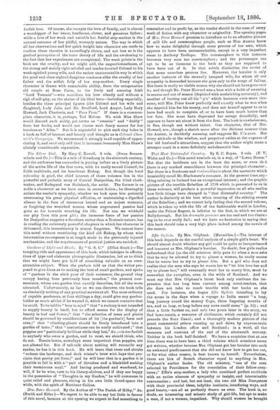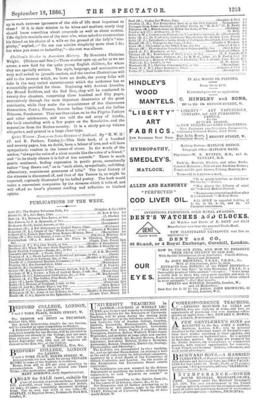Effie Ogilvie. By Mrs. Oliphant. (Macmillan.)—The interest of this book
depends on the careful analysis of a simple girl's heart. We should almost doubt whether any girl could be quite so inexperienced and innocent as Mrs. Oliphant's heroine. No doubt, few girls realise beforehand that (as the old minister drily puts it) when a man asks that he may be allowed to try to please a woman, he really means that he wants her to try to please him. But a girl who does not realise that the man who says he wants her to "let him love her and
try to please her," will eventually want her to marry him, must be somewhat the exception, even in the wilds of Scotland. And we must say that Mrs. Oliphant's latest book only confirms the im- pression that has long been current among novel.readera, that she does not take so much trouble with her books as she used. For instance, she began Effie Ogilvie intending to lay the scene in the days when a voyage to India meant "a long, long journey round the stormy Cape, three lingering months of sea, and so long, so long before any news could come" (p. 32) ; and then a little further on, and only two years later in the story, we find lawn-tennis, a resource of civilisation which certainly did not precede the Suez Canal; and a thoroughly modern picture of the great commercial prince running up and dOwn by express-train between his London office and Scotland ; in a word, all the manners and customs of the end of the nineteenth century. Neither is the book half-finished. We have a suspicion that at one time there was to have been a third volume which somehow never got written, whether because Mrs. Oliphant got her heroine into such an awkward predicament that she did not know how to get her out, or for what other reason, is best known to herself. Nevertheless, there are bits of Scotch character equal to anything in Mrs. Oliphant's earlier books. The old minister, "one of the men selected by Providence for the consolation of their fellow-crea- tures ;" Effie's step-mother, a lady who combined perfect rectitude with an entire absence of sympathy or insight, and interminable
conversation ; and last, but not least, the two old Miss Dempsters a with their provincial ideas, ladylike instincts, interfering ways, and good hearts,—are all as perfectly drawn as ever. The book is, no doubt, an interesting and minute study of girl-life, but apt to make a man, if not a woman, impatient. Why should women be brought
fbup in such extreme ignorance of the side of life most important to them ? If it is their mission to be wives and mothers, surely they should know something about proposals as well as about mutton. Effie Ogilvie reminds one of the man who, when asked to congratulate his friend on his choice of a wife on the ground of the lady's "sim- plicity," replied,—" No one can admire simplicity more than I do; ut when you come to imbecility,"—the rest was silence.



































 Previous page
Previous page